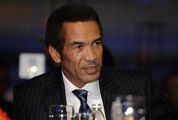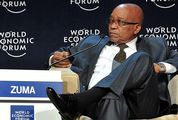THE contentious issue of strike ballots is on the table for discussion between the government, business and labour in ongoing talks convened by Deputy President Cyril Ramaphosa.
Mr Ramaphosa, who is scheduled to appear in Parliament on Wednesday to give an update on parastatals, was tasked by President Jacob Zuma to facilitate a dialogue between the social partners in the National Economic Development and Labour Council on the violent and prolonged nature of strikes, as well as on wage inequalities.
Two technical task teams are working on these issues. The parties last met about two weeks ago and talks were moving rapidly.
On Tuesday Economic Development Minister Ebrahim Patel told MPs that strike ballots and picketing were under discussion. This was within the context of codes of conduct during and prior to industrial action.
The dialogue is looking at both workers’ grievances over low pay and the damaging effect of prolonged conflict on the economy.
Talks have now boiled down to a national minimum wage and a more constructive industrial relations environment.
"We are looking at picketing rules and strike ballots so that we create a more organised, systematic thing in which the will of the workers is clearly there," he said.
The parties are also looking at the creation of workplace forums to foster partnerships between business and labour.
Mr Patel expected the first phase of the work of the technical task teams to be completed by the end of this year.
"As you can imagine there are deep institutional issues about how the labour market works, about the policy frameworks and so on. But we are moving rapidly and are meeting regularly," the minister told Business Day.
Business lobbied hard for a provision in the draft Labour Relations Amendment Act requiring compulsory secret pre-strike ballots to be retained, but African National Congress MPs — under pressure from the Congress of South African Trade Unions — removed it. Proponents of ballots argue that they ensure strikes are democratic and will reduce violence against workers who are reluctant to participate in industrial action.
Mr Patel stressed the importance of building a deeper partnership between business and labour. "If business and labour are at war with each other in this period of enormous global challenges we will just score own goals."
Mr Ramaphosa has in the past publicly endorsed the idea of pre-strike balloting and a national minimum wage.
The deputy president has been at the forefront of managing crises, including at the state’s ailing companies. In December the Cabinet assigned him to develop "turnaround strategies" to help state-owned enterprises play a more "meaningful" role in the economy.
Mr Ramaphosa will update the nation on Eskom, South African Airways and the South African Post Office during a briefing to the National Council of Provinces.
With Natasha Marrian

Deputy President Cyril Ramaphosa briefs the media on the new e-tolls dispensation on Wednesday. Picture: GCIS
THE contentious issue of strike ballots is on the table for discussion between the government, business and labour in ongoing talks convened by Deputy President Cyril Ramaphosa.
Mr Ramaphosa, who is scheduled to appear in Parliament on Wednesday to give an update on parastatals, was tasked by President Jacob Zuma to facilitate a dialogue between the social partners in the National Economic Development and Labour Council on the violent and prolonged nature of strikes, as well as on wage inequalities.
Two technical task teams are working on these issues. The parties last met about two weeks ago and talks were moving rapidly.
On Tuesday Economic Development Minister Ebrahim Patel told MPs that strike ballots and picketing were under discussion. This was within the context of codes of conduct during and prior to industrial action.
The dialogue is looking at both workers’ grievances over low pay and the damaging effect of prolonged conflict on the economy.
Talks have now boiled down to a national minimum wage and a more constructive industrial relations environment.
"We are looking at picketing rules and strike ballots so that we create a more organised, systematic thing in which the will of the workers is clearly there," he said.
The parties are also looking at the creation of workplace forums to foster partnerships between business and labour.
Mr Patel expected the first phase of the work of the technical task teams to be completed by the end of this year.
"As you can imagine there are deep institutional issues about how the labour market works, about the policy frameworks and so on. But we are moving rapidly and are meeting regularly," the minister told Business Day.
Business lobbied hard for a provision in the draft Labour Relations Amendment Act requiring compulsory secret pre-strike ballots to be retained, but African National Congress MPs — under pressure from the Congress of South African Trade Unions — removed it. Proponents of ballots argue that they ensure strikes are democratic and will reduce violence against workers who are reluctant to participate in industrial action.
Mr Patel stressed the importance of building a deeper partnership between business and labour. "If business and labour are at war with each other in this period of enormous global challenges we will just score own goals."
Mr Ramaphosa has in the past publicly endorsed the idea of pre-strike balloting and a national minimum wage.
The deputy president has been at the forefront of managing crises, including at the state’s ailing companies. In December the Cabinet assigned him to develop "turnaround strategies" to help state-owned enterprises play a more "meaningful" role in the economy.
Mr Ramaphosa will update the nation on Eskom, South African Airways and the South African Post Office during a briefing to the National Council of Provinces.
With Natasha Marrian






















Change: -2.60%
Change: -2.88%
Change: -2.44%
Change: -2.44%
Change: -5.26%
Data supplied by Profile Data
Change: 0.00%
Change: 0.00%
Change: -2.60%
Change: 0.00%
Change: 0.00%
Data supplied by Profile Data
Change: 1.98%
Change: -0.06%
Change: -0.19%
Change: -0.09%
Change: 0.10%
Data supplied by Profile Data
Change: 0.00%
Change: 0.00%
Change: 0.00%
Change: 0.00%
Change: 0.00%
Data supplied by Profile Data